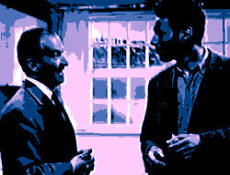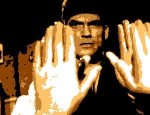Film Review
Louis de Funès had appeared in over a hundred films, mostly in
walk-on parts, before film directors and producers started offering him
substantial roles worthy of his talents as an actor and comic
performer.
Mon pote le
gitan was one of the first films in which de Funès had,
effectively, the lead role, although he received second billing after
the more established comic actor Jean Richard. In this film,
which is based on Michel Duran's stage play
Les Pittuiti's, de Funès
perfects the character for which he would become best known in his
years of celebrity, that of the mean-spirited
petit bourgeois businessman.
To say that de Funès nails the part from the first scene is
understating matters. It is a comedy tour de force, guaranteed to
make you laugh, and without it the film would scarcely be worth
watching.
It was no accident that Louis de Funès was given the main role
in the film - it was his brother-in-law (his sister's husband)
François Gir who directed it. Gir, the son of the esteemed
character actress Jeanne Fusier-Gir, made only one film for cinema,
this one; for most of his career, he worked for French television,
directing over twenty TV movies. He started out by working as an
assistant on several films by another prominent relative of his, Sacha
Guitry, including
La Poison (1951) and
Si Versailles m'était conté
(1954). With his cinematic debut, Gir shows immense promise, his
film being very different in style from most popular French comedies of
its time. Indeed, bizarrely, it tends towards Italian neo-realism
in places, particularly in its authentic depiction of a gypsy community.
The opening sequence over which the credits are laid could well have been lifted from a
neo-realist drama by Pasolini or De Sica.
Whilst Louis de Funès is unquestionably the star of the film
(you can hardly wait for him to return every time he goes out of camera
shot), the cast includes some other notable names. Jean Richard
was a popular comic actor of the time, famous for his collaborations
with director Jean Bastia, including
Nous autres à Champignol
(1957), although he is now best remembered for playing Inspector
Maigret in a French television series that ran for twenty years.
Convincingly cast as a juvenile gypsy with literary aspirations is a
young Michel Subor, who would earn lasting fame when Jean-Luc Godard
gave him the lead role in his controversial political drama
Le
Petit soldat (1963). By contrast, Brigitte Auber's
best years were already behind her - previously given a substantial
part in Alfred Hitchcock's
To Catch a Thief (1955), she is
relegated to a minor role in this film. It could be argued that
Mon pote le gitan was Louis de
Funès's springboard to stardom. Within a decade, he would
become France's best known and most bankable comic actor, the years of
obscurity finally at an end.
© James Travers 2015
The above content is owned by frenchfilms.org and must not be copied.
Film Synopsis
The Védrines are a perfectly respectable middleclass family who
lead a perfectly respectable middleclass life - until the rebellious
son Théo manages to get a gypsy girl pregnant. The girl's
father, Pittuiti, is incensed and, according to the traditions of his
people, it is only fair that his son Bruno should put the
Védrines' daughter Gisèle in the family way. Bruno
pays a personal call on Monsieur Védrine, a successful
publisher, hoping to secure a literary prize that will allow him to
make his name as a writer. Védrine is more than willing to
offer him the money, if it will keep him and his sister out of his
hair, but he soon discovers that money cannot solve every problem...
© James Travers
The above content is owned by frenchfilms.org and must not be copied.



